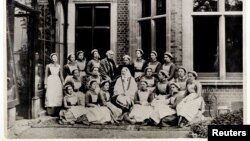A new exhibition celebrates the life of Florence Nightingale, an English woman whose ideas about cleanliness are important to this day.
The exhibit can be seen at the Florence Nightingale Museum at St Thomas’ Hospital in London. It marks the 200th anniversary of Nightingale’s birth.
The exhibit tells the story of how she overcame difficulties to become the world’s most famous nurse. The show recreates her bedroom, lets visitors hear a recording of her voice and even smell the perfume she wore.
Fiona Hibberts is a nursing consultant and works for the hospital’s Nightingale Academy. She described Nightingale’s work as “really, really important” to future generations.
“Obviously, she was a forceful leader,” Hibberts said. “And we need clear, visible, strong leadership today and certainly in modern nursing.”
The exhibition, called “Nightingale in 200 Objects, People & Places,” will continue for a year.
St Thomas’ is one of a small number of hospitals in Britain with an area for the treatment of coronavirus patients.
“The emphasis on sanitation, good hygiene, fresh air, exercise, good food... no matter how much we advance, those fundamental foundational principles of Florence are still very much the basis of modern nursing,” Hibberts noted.
She added, “It’s the same old message. Wash your hands.”
Nightingale became world famous after she and a small team of medical workers traveled to modern-day Istanbul during the Crimean War. It was fought mainly on the Crimean Peninsula in the middle of the 1850s.
Nightingale helped treat British soldiers wounded in the fighting. In an unclean hospital, she saws thousands of soldiers die from infectious diseases. Their deaths led to her decision to try to improve conditions.
The lamp she used when visiting patients at night is on show at the exhibition, as is the nurses’ uniform she created.
Yvonne Moores is Chair of the Florence Nightingale Foundation and Britain’s former national Chief Nursing Officer.
“If Florence Nightingale herself was here, she would be supporting all that’s being said at the moment. She was absolutely into infection control, hand washing, being very observant,” she said.
Nightingale continued to work and to write late into old age. She died in 1910, at the age of 90.
I’m John Russell.
Mindy Burrows reported on this story for Reuters. John Russell adapted it for VOA Learning English. George Grow was the editor.
Editor's Note: Florence Nightingale died in 1910. This story has been corrected to reflect the correct year of her death.
_____________________________________________________________
Words in This Story
exhibition – n. an event at which objects (such as works of art) are put out in a public space for people to look at : a public show of something
nurse – n. some who cares for the sick or older adults
perfume – n. a substance that produces a pleasant smell
consultant – n. a person who provides advice to someone else
emphasis – n. special importance or attention given to something
hygiene – n. conditions or actions necessary for good health
principle – n. a law or rule
lamp – n. any kind of device for producing light
uniform – n. a special kind of clothing that is worn by all the members of a group or organization (such as an army or team)
We want to hear from you. Write to us in the Comments Section.





